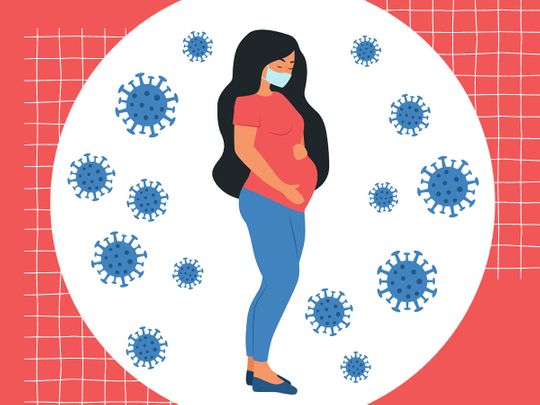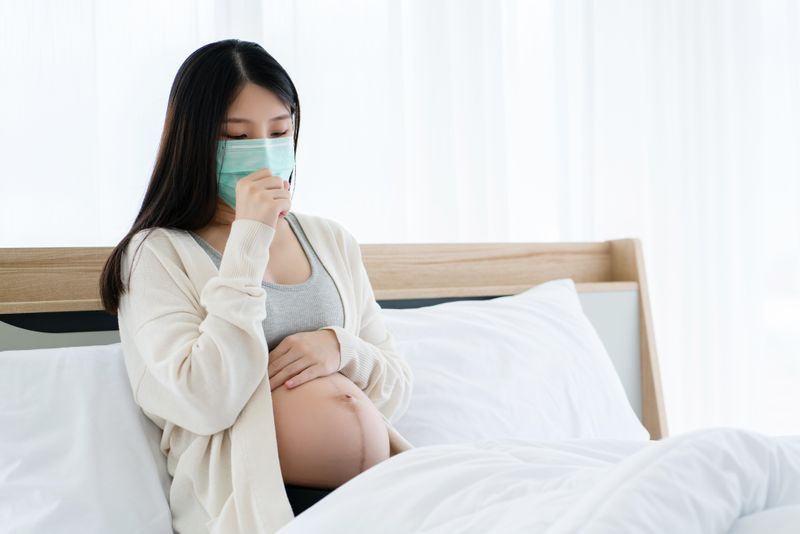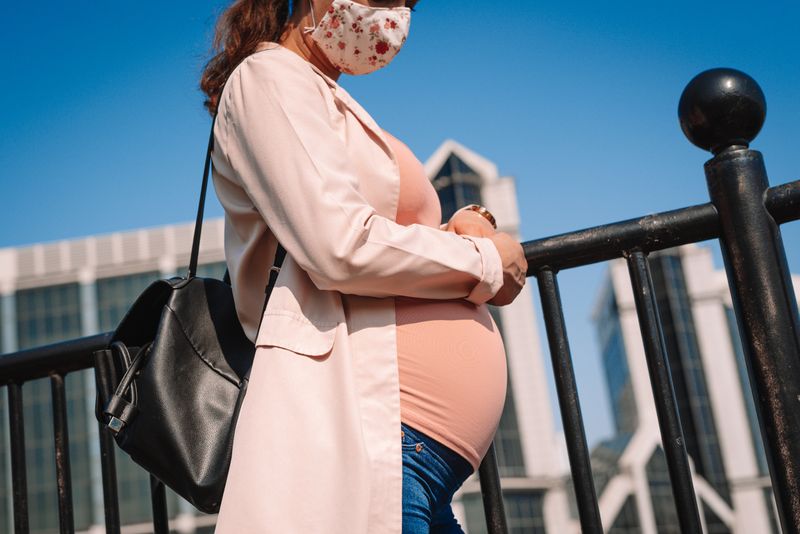
What happens if you are pregnant and think you may have COVID-19, or you test positive for COVID-19 in the UAE? Here’s everything you need to know…
Does being pregnant make me more likely to catch COVID-19?
"All available evidence suggests that pregnant women are not at greater risk of becoming seriously unwell than other healthy adults if they develop coronavirus,” says Dr Usha Sethi, specialist gynaecologist at Aster Clinic in Tecom. “Most pregnant women experience only mild or moderate symptoms.”
Does being pregnant make it more likely I will get severe COVID-19?
A US-based study suggests that pregnant women with COVID-19 are more likely to be hospitalised and are at increased risk for intensive care unit admission and receipt of mechanical ventilation than non-pregnant women. However pregnant women are also as likely to recover from COVID-19 as non-pregnant women, and there is no difference in death rates between pregnant women and non-pregnant women.
Does being infected with COVID-19 increase my risk of miscarriage or other complications?
So far there is minimal evidence of any increased risk of pregnancy loss and no evidence of foetal malformations recorded in pregnant women who are infected with COVID-19.
Based on data from other coronaviruses, such as SARS and MERS, the American College of Obstetricians and Gynecologists notes that pregnant women who get COVID-19 may have a higher risk for some complications, such as preterm birth. However, this data is extremely limited, and the infection may not be the direct cause of preterm birth.
If I am pregnant and I get a cough or show other possible COVID symptoms in the UAE, do I have to get tested for COVID-19?
“Any pregnant lady suffering with unusual symptoms or suspecting she might have Covid 19 should get in touch with her healthcare provider immediately,” says Dr Salma Ballal of Genesis Healthcare Center Dubai. It is important to give a good and detailed history to your caring team regarding your symptoms as this has very important implications for your baby’s and your family’s health. “Testing is advisable as a management plan can be put in place if a patient is confirmed positive,” adds Dr Salma.
Is the COVID test free for pregnant women in the UAE?
“Covid testing is not covered by the majority of insurance companies and patients have to pay out of pocket in private facilities,” says Dr Deemah Salem of Genesis Healthcare Center Dubai. “However we believe it is being offered free of charge to pregnant ladies in government SEHA and DHA facilities.”
According to the UAE government website U.ae “Drive-through National Screening Centres for COVID-19 are available across all emirates. Download the SEHA app or call the Estijaba helpline at 8001717 to book a screening appointment for COVID-19 from anywhere in the UAE. Location and time of the screening will be confirmed to you through a text message. The test is free of charge for those suspected to have contracted the virus and for vulnerable groups [which includes pregnant women]. Others would be charged Dh370 per person.”

If I am pregnant and test COVID-positive do I have to be admitted to hospital in the UAE?
“This really depends on the general condition of the mother,” says Dr Salma Ballal Consultant Obstetrician and Gynaecologist at Genesis Healthcare Center in Dubai. “If the mum is suffering from mild symptoms then self-isolating at home might be possible. If the woman's symptoms start getting worse then admission to hospital is necessary, especially after 28 weeks, as there is some evidence to suggest they are at a higher risk of complications compared to ladies prior to 28 weeks pregnant.”
Either way, if you test positive for COVID-19 while pregnant you should inform your doctor as soon as possible. “Those who have been advised to self-isolate should stay indoors and avoid contact with others for 14 days,” says Dr Usha Sethi, specialist gynaecologist at Aster Clinic, Tecom. “Routine antenatal visits can be delayed until after the recommended period of isolation, unless she in need of urgent obstetric or medical care.
“Seek medical advice if you feel your symptoms are worsening or if you are not getting better, this may be a sign that you are developing a more significant infection that requires specialised care.”
However, Dr Shiva Harikrishnan, consultant Ob/Gyn at Medcare Women & Children Hospital says that it’s advisable for any pregnant woman who tests as COVID-positive to be admitted, whether she is showing symptoms or not. “Because a pregnant woman who is Covid-positive is considered in the ‘high risk category’, as per WHO guidelines, she should be admitted to the hospital once the test is positive,” says Dr Shiva. “According to the UAE National guidelines, once the pregnant woman is positive, even if she is asymptomatic, she needs to be kept in the hospital until she has two COVID-negative test reults.”
What happens if I am positive with COVID-19 and I go into labour in the UAE?
“If a pregnant woman is Covid-positive when she goes into labour she will be delivered at a facility that is accepting Covid patients,” says Dr Salma. “Many private hospitals have become ‘Covid-free’. So the options for which hospital to deliver at will be limited. But the patient will be allowed to labour and deliver as usual with of course precautions taken to decrease contamination and spread to staff, family members and the newborn baby.”
"Covid-positive pregnant women are cared for in an isolated and dedicated maternity area within the maternity unit," says Dr Usha Sethi, specialist gynaecologist, Aster Clinic, Tecom. "The maternity team follows infection control measures to lower the spread of infection. Continuous baby monitoring and mother’s assessment is done during labour."
If I have COVID-19 when I go into labour do I have to have a C section in the UAE?
“There is currently no evidence to suggest that you cannot give birth vaginally or that you would be safer having a caesarean birth if you have suspected or confirmed coronavirus, unless the woman’s respiratory condition demands urgent delivery,” says Dr Usha of Aster Clinic. "Until now there has been no evidence of perinatal transmission of Covid infection to the baby while passing through the birth canal, hence caesarean delivery is reserved only for obstetric indications," adds Dr Shiva Harikrishnan, consultant Ob/Gyn at Medcare Women & Children Hospital
If I have COVID-19 when I go into labour can I have pain relief?
“There is no evidence that women with suspected or confirmed coronavirus cannot have an epidural or a spinal block,” says Dr Usha Sethi, specialist gynaecologist at Aster Clinic. However, gas and air and labouring in water may be restricted due to concerns about aerosol transmission, but it is best to check directly with your hospital.
If I have COVID-19 when I give birth will I be separated from my baby in the UAE?
Dr Usha Sethi says: “All babies born to COVID-19 positive mothers are tested for Covid, have appropriate close monitoring and early involvement of neonatal care, where necessary, and need neonatal follow-up.
“Given the current limited evidence the recommendations are that women and healthy infants, not otherwise requiring neonatal care, are kept together in the immediate postpartum period.”
However, Dr Deemah Salem of Genesis Healthcare Centre in Dubai says: “This will be dependant on the guidelines the hospital has chosen to follow based on their NICU policy so it’s always advisable for pregnant woman to discuss this with their physician to get more clarity regarding the hospital protocol that they chose to give birth in. The WHO has suggested to allow skin to skin contact with baby and breastfeeding with precautions measures in place to reduce the risk of transmission. Separation of mom and baby should be based on a case-by-case basis considering certain factors.”
If you are concerned that your symptoms may lead to you being isolated from your baby and you do not want this to happen, the Evidence Based Birth website has a template of a waiver you can print out to say that you do not consent to your baby being taken away from you

If I have COVID-19 when I give birth will I be able to breastfeed in the UAE?
Dr Usha Sethi of Aster clinic says: “With limited studies so far, there is no evidence showing that the virus can be carried or passed on in breastmilk. The well-recognised benefits of breastfeeding and the protection it offers to babies outweigh any potential risks of the transmission of Coronavirus through breastmilk.
“The main risk of breastfeeding is close contact between you and your baby, as if you cough or sneeze, this could contain droplets which are infected with the virus, leading to infection of the baby after birth
“To decide breastfeeding or express breast milk do depends upon your and baby’s health condition. However you feed your baby, the following precautions are recommended:
- Wash your hands before touching your baby, breast pump or bottles
- Try to avoid coughing or sneezing on your baby while feeding at the breast or from a bottle
- Consider wearing a mask or face covering while feeding
- Follow recommendations for pump/bottle cleaning after each use
- Consider asking someone who is well to feed your expressed breast milk or formula milk to your baby
What happens if my child or partner catches COVID-19 while I am pregnant in the UAE?
"If the husband or the partner is tested positive, they need to follow quarantine rules and try to keep away from the pregnant woman until it is safe," says Dr Shiva Harikrishnan, consultant Ob/Gyn at Medcare Women & Children Hospital.
I am pregnant but I already have a child who needs to be entertained. Can I take my child out to play areas etc in the UAE?
“Pregnant ladies should be careful about where and when they choose to go out,” says Dr Deemah Salem. “Although the numbers in the UAE are dropping, we still have to continue working hard in reducing the numbers further. Expecting mothers should try and avoid crowded play area and if they must go then practice all safety precautions like hand washing, wearing a mask and avoid crowds.”
I am pregnant and working from home in the UAE, but my husband is still required to go into the office. Is this safe?
“There are no medical guidelines specific to pregnant women husbands and their work,” says Dr Deemah Salem. “But the CDC does recommend that ‘measures to prevent infection with SARS-CoV-2 should be emphasized for pregnant women and their families’. So husbands who are obligated to go out to work should be very careful and practice the safety precautions seriously.”












